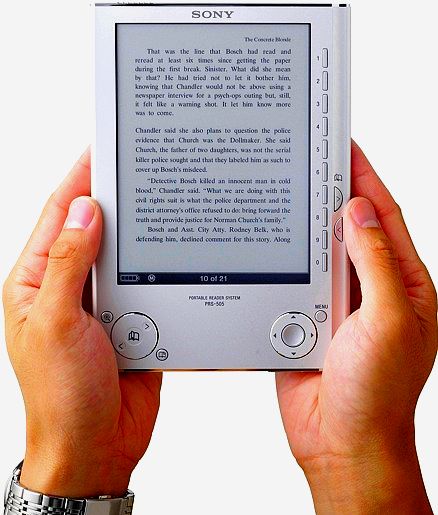The E-reading Development Compared To Past MP3 Culture
Cheaper Books and Violation of Copyright?
 The value added tax (VAT) for a Dutch digital book consists 19% instead of the 6% for a printed one. This results in only a minimal difference between both prices, where most people would expect the digital tangible version cheaper. Also newspapers can be read on most of the e-readers, which makes future classic books and newspapers unnecessary. Digital documents are easier to buy (online), transport and carry on different media devices (compatibility). Another benefit is the consequenses for the environment, especially the cutting of trees and the emission of carbon dioxide. Digital book-reading also avoids information storage by the use of big bookshelves in the future, ienvironmentn fact the digital bookfiles are easy downloadable and they can be deleted very fast. This results in a new paradigm of reading books if the Netherlands will adapt to this new technology like they did to for example: MP3:
The value added tax (VAT) for a Dutch digital book consists 19% instead of the 6% for a printed one. This results in only a minimal difference between both prices, where most people would expect the digital tangible version cheaper. Also newspapers can be read on most of the e-readers, which makes future classic books and newspapers unnecessary. Digital documents are easier to buy (online), transport and carry on different media devices (compatibility). Another benefit is the consequenses for the environment, especially the cutting of trees and the emission of carbon dioxide. Digital book-reading also avoids information storage by the use of big bookshelves in the future, ienvironmentn fact the digital bookfiles are easy downloadable and they can be deleted very fast. This results in a new paradigm of reading books if the Netherlands will adapt to this new technology like they did to for example: MP3:
“MP3: Without Data reduction, digital audio signals typically consist of 16 bit samples recorded at a sampling rate more than twice the actual audio bandwidth” (Source)
Lots of people namely do compare the coming revolution of the digital library with the growth and success of MP3 in the past. So they claim that the development of the e-reader will follow the same path like the MP3 technology did in the past. But there are a few reasons why i think this new phenomena will establish itself in a different way. Another important comparison though is, that like Mp3 also digital books can be carried very easily by different devices. So people can take the books with them very easy like they are used to take music with them as well. They main question is, why do you want to take 300 books with you wherever you go? A book takes much longer to finish than the everage MP3 file, so in that case it is not likely that someone will even use 20 pieces a day or even more and i’m not even speaking about finishing. So this influences the way people ‘scroll’ through their music, by last/pause/play/next. It is unlikely that a reader will switch through different books like skipping pages. Music devices focus on listening, e-books on reading so while listening it is much easier to be influenced by your environment as well. Also the fact that digital books are still very expensive does not compare to the MP3 culture where files are easily downloaded and shared.
In the future it will be possible for authors to improve their edition an give updates to their books as well. Which makes it very easy for users to get a recent version of the book instead of the older one they have. I cannot imagine that a new version would cost them as much as the first one they bought. With that in mind, a real conversation will take place between author and reader. Because the author will get feedback on his updates there will be an interaction between both which will exceed the current debates. The reader is aware of changes and this will automatically result in comments, which will stimulate any user-oriented author.
So, it is true that the new development concerning ebooks has certain similarities with the development of MP3 in the past. But except the similarities, there is also a different perspective through which this development can be analysed. It is not quite clear how the exchange of e-books through different media devices is possible and if fraud is quite simple, in that case the e-reading development will indeed look like the past MP3 culture. Because then people possibly will download and share thousands of books and only read the few pages they like and immediatly remove the rest.
Elias van Hees
Word count: 608